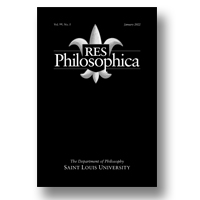|
articles |
|
1.
|
Res Philosophica:
Volume >
98 >
Issue: 4
Tim Juvshik
Artifactualization without Physical Modification
abstract |
view |
rights & permissions
| cited by
Much recent discussion has focused on the nature of artifacts, particularly on whether they have essences. While it’s often held that artifacts are intentiondependent and necessarily have functions, it’s equally held, though far less discussed, that artifacts are the result of physical modification of some material objects. This article argues that the physical modification condition on artifacts is false. First, it formulates the physical modification condition perspicuously for the first time. Second, it offers counterexamples to this condition. Third, it considers and rejects two responses to these counterexamples, one which appeals to the distinction between being a K and being used as a K and another which argues that the counterexamples are merely of functional, not artifactual, kinds. Finally, it considers and rejects a more general objection that appropriation makes artifact creation too easy. Therefore, artifacts can be created by appropriation, and I sketch some success conditions for such appropriation.
|
|
|
|
|
2.
|
Res Philosophica:
Volume >
98 >
Issue: 4
Callie K. Phillips
Why Future-Bias Isn't Rationally Evaluable
abstract |
view |
rights & permissions
| cited by
Future-bias is preferring some lesser future good to a greater past good because it is in the future, or preferring some greater past pain to some lesser future pain because it is in the past. Most of us think that this bias is rational. I argue that no agents have futurebiased preferences that are rationally evaluable—that is, evaluable as rational or irrational. Given certain plausible assumptions about rational evaluability, either we must find a new conception of future-bias that avoids the difficulties I raise, or we must conclude that future-biased preferences are not subject to rational evaluation.
|
|
|
|
|
3.
|
Res Philosophica:
Volume >
98 >
Issue: 4
Joseph Vukov
Rationality and Cognitive Enhancement
abstract |
view |
rights & permissions
| cited by
When is it rational to undergo cognitive enhancement? In the case of what I’ll call massive cognitive enhancement, my answer is never. The reason is that one must base one’s decision to undergo massive cognitive enhancement on what I’ll call either phenomenal or non-phenomenal outcomes. If the former, the choice is not rational because massive cognitive enhancements are transformative and, I’ll argue with Paul (2015), transformative experiences cannot be chosen rationally. If the latter, the choice is not rational because it ought to be based at least partly on phenomenal outcomes. This argument, however, leaves open the idea that it may nonetheless be rational to choose massive cognitive enhancement for others—for example, one’s children. The article explores this possibility, arguing that choosing enhancement for others can be rational or moral, but not both.
|
|
|
|
|
discussion |
|
4.
|
Res Philosophica:
Volume >
98 >
Issue: 4
Stafan Rinner
Recanati on 'That'-clauses
abstract |
view |
rights & permissions
| cited by
The received view concerning belief ascriptions of the form ‘A believes that S’ says (A) that ‘believe’ denotes a relation holding between agents and truth-bearing entities (propositions), and (B) that ‘that’-clauses are referential expressions denoting propositions. In “‘That’-Clauses as Existential Quantifiers,” Recanati expresses his dissatisfaction with the received view. According to Recanati, (B) threatens semantic innocence. Therefore, following Panaccio, Recanati proposes to treat ‘that’-clauses of the form ‘that S’ as restricted existential quantifiers of the form ‘For some p such that p is true iff S.’ In this article, I will argue that together with Kripke’s disquotational principle connecting sincere assertion and belief this analysis leads to unacceptable consequences. Since, as we shall see, the solution cannot be to reject Kripke’s disquotational principle, it will follow that the Recanati-Panaccio analysis cannot be correct. Concluding, I will show that the argument against the Recanati-Panaccio analysis of ‘that’-clauses also provides a more general way of testing semantic analyses and that, unlike the Recanati-Panaccio analysis, the received view passes this test.
|
|
|
|
|
book symposium |
|
5.
|
Res Philosophica:
Volume >
98 >
Issue: 4
David McPherson
Précis of Virtue and Meaning
view |
rights & permissions
| cited by
|
|
|
|
|
6.
|
Res Philosophica:
Volume >
98 >
Issue: 4
Philip J. Ivanhoe
Comments on David McPherson's Virtue and Meaning: A Neo-Aristotelian Perspective
view |
rights & permissions
| cited by
|
|
|
|
|
7.
|
Res Philosophica:
Volume >
98 >
Issue: 4
Christian B. Miller
McPherson on Virtue and Meaning
view |
rights & permissions
| cited by
|
|
|
|
|
8.
|
Res Philosophica:
Volume >
98 >
Issue: 4
David McPherson
Replies to Ivanhoe and Miller
view |
rights & permissions
| cited by
|
|
|
|
